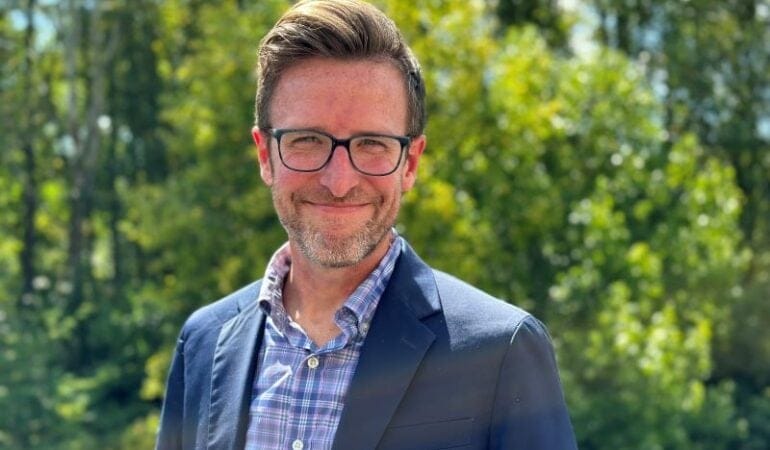
John Farner Named Executive Director of the Babbitt Center for Land and Water Policy
John Farner, a leading expert on water, land use, and agriculture, has been named executive director of the Babbitt Center for Land and Water Policy. Farner will lead the Babbitt Center’s work to promote the integration of land and water management in the United States and around the world.
Farner, who joined the Babbitt Center in September, was previously global chief sustainability officer of the precision agriculture technology company Netafim. He succeeds founding director Jim Holway, who is retiring after leading the Babbitt Center since its launch by the Lincoln Institute of Land Policy in 2017.
“The Babbitt Center has established itself as a thought leader at the nexus of land use planning and water management in the Colorado River Basin under Jim Holway’s leadership, with a focus on connecting and supporting the communities that steward this essential resource,” said George W. McCarthy, president of the Lincoln Institute. “John Farner brings experience and perspectives to this role that will help us deepen our roots in the region, even as we expand our knowledge base and global influence.”
Farner has spent more than 20 years promoting solutions to global environmental challenges, and has addressed the United States Congress, the United Nations, and various other national and global organizations. Before joining Netafim, he served as head of sustainability, public affairs, and strategic initiatives for the US-based Irrigation Association, where he was the chief advocate and spokesperson for the industry before national and international policymakers, as well as NGOs. At Netafim, Farner oversaw initiatives related to agriculture, water replenishment, and corporate social responsibility.
“Water is the lifeblood of the West, and the decisions we make today will have lasting impacts well into our future,” Farner said. “I’m thrilled to be joining such a talented team as we embrace the challenge of making a positive impact on our land, water, and livelihoods. The spotlight on the Colorado River Basin is growing, and the Babbitt Center has proven to be the best resource for tools and solutions that help communities secure their water future. I’m excited to build upon our efforts and expand our reach, sharing what we’ve learned with others facing similar challenges in the United States and around the world.”
Since its founding, the Babbitt Center has developed tools and best practices to support community-led management of land and water resources in the Colorado River Basin, which is dependent on one of the most heavily used and overallocated rivers in the world. It works throughout the seven Colorado River Basin states, binationally across the Basin into Mexico, and with Native American Tribes, helping communities become more resilient and building an exchange of transformative ideas with other arid and semiarid regions.
“Effective land and water management is critically important, especially as the climate changes,” McCarthy noted. “The Babbitt Center is testing innovative new methodologies and approaches for both urban and rural communities, and we’re ready to share these ideas broadly as we help build capacity and resilience in the Basin and beyond.”
Learn more about the Babbitt Center for Land and Water Policy.
